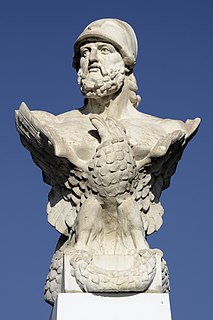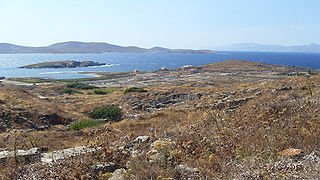This article needs additional citations for verification .(December 2009) (Learn how and when to remove this template message) |
| Millennium: | 1st millennium BC |
| Centuries: | |
| Decades: | |
| Years: | |
| Categories: |
This article concerns the period 469 BC – 460 BC.
This article needs additional citations for verification .(December 2009) (Learn how and when to remove this template message) |
| Millennium: | 1st millennium BC |
| Centuries: | |
| Decades: | |
| Years: | |
| Categories: |
This article concerns the period 469 BC – 460 BC.

The Delian League, founded in 478 BC, was an association of Greek city-states, with the number of members numbering between 150 and 330 under the leadership of Athens, whose purpose was to continue fighting the Persian Empire after the Greek victory in the Battle of Plataea at the end of the Second Persian invasion of Greece. The League's modern name derives from its official meeting place, the island of Delos, where congresses were held in the temple and where the treasury stood until, in a symbolic gesture, Pericles moved it to Athens in 454 BC.

Athens is the capital and largest city of Greece. Athens dominates the Attica region and is one of the world's oldest cities, with its recorded history spanning over 3,400 years and its earliest human presence started somewhere between the 11th and 7th millennium BC.

Themistocles was an Athenian politician and general. He was one of a new breed of non-aristocratic politicians who rose to prominence in the early years of the Athenian democracy. As a politician, Themistocles was a populist, having the support of lower-class Athenians, and generally being at odds with the Athenian nobility. Elected archon in 493 BC, he convinced the polis to increase the naval power of Athens, a recurring theme in his political career. During the first Persian invasion of Greece he fought at the Battle of Marathon and was possibly one of the ten Athenian strategoi (generals) in that battle.
== {{dr|y|y|{{1x|-}}{{{year}}}0|{{1x|-}}{{{1}}}|na}} == {{trim|{{transcluded-section|{{dr|y|y|{{1x|-}}{{{year}}}0|{{1x|-}}{{{1}}}|na}}}} {{#section-h::{{dr|y|y|{{1x|-}}{{{year}}}0|{{1x|-}}{{{1}}}|na}}|Events}}}} == {{dr|y|y|{{1x|-}}{{{year}}}0|{{1x|-}}{{{1}}}|na}} == {{trim|{{transcluded-section|{{dr|y|y|{{1x|-}}{{{year}}}0|{{1x|-}}{{{1}}}|na}}}} {{#section-h::{{dr|y|y|{{1x|-}}{{{year}}}0|{{1x|-}}{{{1}}}|na}}|Events}}}} == {{dr|y|y|{{1x|-}}{{{year}}}0|{{1x|-}}{{{1}}}|na}} == {{trim|{{transcluded-section|{{dr|y|y|{{1x|-}}{{{year}}}0|{{1x|-}}{{{1}}}|na}}}} {{#section-h::{{dr|y|y|{{1x|-}}{{{year}}}0|{{1x|-}}{{{1}}}|na}}|Events}}}} == {{dr|y|y|{{1x|-}}{{{year}}}0|{{1x|-}}{{{1}}}|na}} == {{trim|{{transcluded-section|{{dr|y|y|{{1x|-}}{{{year}}}0|{{1x|-}}{{{1}}}|na}}}} {{#section-h::{{dr|y|y|{{1x|-}}{{{year}}}0|{{1x|-}}{{{1}}}|na}}|Events}}}} == {{dr|y|y|{{1x|-}}{{{year}}}0|{{1x|-}}{{{1}}}|na}} == {{trim|{{transcluded-section|{{dr|y|y|{{1x|-}}{{{year}}}0|{{1x|-}}{{{1}}}|na}}}} {{#section-h::{{dr|y|y|{{1x|-}}{{{year}}}0|{{1x|-}}{{{1}}}|na}}|Events}}}} == {{dr|y|y|{{1x|-}}{{{year}}}0|{{1x|-}}{{{1}}}|na}} == {{trim|{{transcluded-section|{{dr|y|y|{{1x|-}}{{{year}}}0|{{1x|-}}{{{1}}}|na}}}} {{#section-h::{{dr|y|y|{{1x|-}}{{{year}}}0|{{1x|-}}{{{1}}}|na}}|Events}}}} == {{dr|y|y|{{1x|-}}{{{year}}}0|{{1x|-}}{{{1}}}|na}} == {{trim|{{transcluded-section|{{dr|y|y|{{1x|-}}{{{year}}}0|{{1x|-}}{{{1}}}|na}}}} {{#section-h::{{dr|y|y|{{1x|-}}{{{year}}}0|{{1x|-}}{{{1}}}|na}}|Events}}}} == {{dr|y|y|{{1x|-}}{{{year}}}0|{{1x|-}}{{{1}}}|na}} == {{trim|{{transcluded-section|{{dr|y|y|{{1x|-}}{{{year}}}0|{{1x|-}}{{{1}}}|na}}}} {{#section-h::{{dr|y|y|{{1x|-}}{{{year}}}0|{{1x|-}}{{{1}}}|na}}|Events}}}} == {{dr|y|y|{{1x|-}}{{{year}}}0|{{1x|-}}{{{1}}}|na}} == {{trim|{{transcluded-section|{{dr|y|y|{{1x|-}}{{{year}}}0|{{1x|-}}{{{1}}}|na}}}} {{#section-h::{{dr|y|y|{{1x|-}}{{{year}}}0|{{1x|-}}{{{1}}}|na}}|Events}}}}
== {{ucfirst:{{{1}}}}} == {{preprocess|{{((}}transcluding articles {{!}} {{for loop|{{!}}|call=Year article|pc1n=1|pc1v={{{decade}}}0|pv=2|-9|-8|-7|-6|-5|-4|-3|-2|-1}} {{!}} {{#ifeq:{{{decade}}}|-0|{{void|There is no BC year 0}}|{{Year article|{{{decade}}}0}}}} {{))}}}} {{for loop| |call=Transclude {{{1}}}|{{{decade}}}9|{{{decade}}}8|{{{decade}}}7|{{{decade}}}6|{{{decade}}}5|{{{decade}}}4|{{{decade}}}3|{{{decade}}}2|{{{decade}}}1}} {{#ifeq:{{{decade}}}|-0|{{void|There is no BC year 0}}| {{Transclude {{{1}}}|{{{decade}}}0}} }} == {{ucfirst:{{{1}}}}} == {{preprocess|{{((}}transcluding articles {{!}} {{for loop|{{!}}|call=Year article|pc1n=1|pc1v={{{decade}}}0|pv=2|-9|-8|-7|-6|-5|-4|-3|-2|-1}} {{!}} {{#ifeq:{{{decade}}}|-0|{{void|There is no BC year 0}}|{{Year article|{{{decade}}}0}}}} {{))}}}} {{for loop| |call=Transclude {{{1}}}|{{{decade}}}9|{{{decade}}}8|{{{decade}}}7|{{{decade}}}6|{{{decade}}}5|{{{decade}}}4|{{{decade}}}3|{{{decade}}}2|{{{decade}}}1}} {{#ifeq:{{{decade}}}|-0|{{void|There is no BC year 0}}| {{Transclude {{{1}}}|{{{decade}}}0}} }}

The 5th century BC started the first day of 500 BC and ended the last day of 401 BC.
This article concerns the period 479 BC – 470 BC.
This article concerns the period 459 BC – 450 BC.
This article concerns the period 429 BC – 420 BC.
Year 465 BC was a year of the pre-Julian Roman calendar. At the time, it was known as the Year of the Consulship of Vibulanus and Barbatus. The denomination 465 BC for this year has been used since the early medieval period, when the Anno Domini calendar era became the prevalent method in Europe for naming years.
Year 461 BC was a year of the pre-Julian Roman calendar. At the time, it was known as the Year of the Consulship of Gallus and Cornutus. The denomination 461 BC for this year has been used since the early medieval period, when the Anno Domini calendar era became the prevalent method in Europe for naming years.
Year 425 BC was a year of the pre-Julian Roman calendar. At the time, it was known as the Year of the Tribunate of Atratinus, Medullinus, Cincinnatus and Barbatus. The denomination 425 BC for this year has been used since the early medieval period, when the Anno Domini calendar era became the prevalent method in Europe for naming years.
Year 462 BC was a year of the pre-Julian Roman calendar. At the time, it was known as the Year of the Consulship of Tricipitinus and Cicurinus. The denomination 462 BC for this year has been used since the early medieval period, when the Anno Domini calendar era became the prevalent method in Europe for naming years.
Year 460 BC was a year of the pre-Julian Roman calendar. At the time, it was known as the Year of the Consulship of Poplicola and Sabinus. The denomination 460 BC for this year has been used since the early medieval period, when the Anno Domini calendar era became the prevalent method in Europe for naming years.
Year 463 BC was a year of the pre-Julian Roman calendar. At the time, it was known as the Year of the Consulship of Priscus and Helva. The denomination 463 BC for this year has been used since the early medieval period, when the Anno Domini calendar era became the prevalent method in Europe for naming years.
Year 464 BC was a year of the pre-Julian Roman calendar. At the time, it was known as the Year of the Consulship of Albinus and Fusus. The denomination 464 BC for this year has been used since the early medieval period, when the Anno Domini calendar era became the prevalent method in Europe for naming years.

The King's Peace, also known as the Peace of Antalcidas, was a peace treaty guaranteed by the Persian King Artaxerxes II that ended the Corinthian War in ancient Greece. The treaty's alternate name comes from Antalcidas, the Spartan diplomat who traveled to Susa to negotiate the terms of the treaty with the king of Achaemenid Persia. The treaty was more commonly known in antiquity, however, as the King's Peace, a name that reflects the depth of Persian influence in the treaty, as Persian gold had driven the preceding war. The treaty was a form of Common Peace, similar to the Thirty Years' Peace which ended the First Peloponnesian War.
The Peace of Callias is a purported treaty established around 449 BC between the Delian League and Persia, ending the Greco-Persian Wars. The peace was agreed as the first compromise treaty between Achaemenid Persia and a Greek city.

Cimon or Kimon was an Athenian statesman and general in mid-5th century BC Greece. He was the son of Miltiades, the victor of the Battle of Marathon. Cimon played a key role in creating the powerful Athenian maritime empire following the failure of the Persian invasion of Greece by Xerxes I in 480–479 BC. Cimon became a celebrated military hero and was elected to the rank of strategos after fighting in the Battle of Salamis.

Pentecontaetia is the term used to refer to the period in Ancient Greek history between the defeat of the second Persian invasion of Greece at Plataea in 479 BC and the beginning of the Peloponnesian War in 431 BC. The term originated with a scholiast on Thucydides, who used it in their description of the period. The Pentecontaetia was marked by the rise of Athens as the dominant state in the Greek world and by the rise of Athenian democracy. Since Thucydides focused his account on these developments, the term is generally used when discussing developments in and involving Athens.
Ephialtes was an ancient Athenian politician and an early leader of the democratic movement there. In the late 460s BC, he oversaw reforms that diminished the power of the Areopagus, a traditional bastion of conservatism, and which are considered by many modern historians to mark the beginning of the "radical democracy" for which Athens would become famous. These powers included the scrutiny and control of office holders, and the judicial functions in state trials. He introduced pay for public officeholders, reduced the property qualifications for holding a public office, and created a new definition of citizenship. Ephialtes, however, would not live to participate in this new form of government for long. In 461 BC, he was assassinated, probably at the instigation of resentful oligarchs, and the political leadership of Athens passed to his deputy, Pericles.

Classical Greece was a period of around 200 years in Greek culture. This Classical period saw the annexation of much of modern-day Greece by the Persian Empire and its subsequent independence. Classical Greece had a powerful influence on the Roman Empire and on the foundations of Western civilization. Much of modern Western politics, artistic thought, scientific thought, theatre, literature and philosophy derives from this period of Greek history. In the context of the art, architecture, and culture of Ancient Greece, the Classical period corresponds to most of the 5th and 4th centuries BC. The Classical period in this sense follows the Greek Dark Ages and Archaic period and is in turn succeeded by the Hellenistic period.

The city of Athens during the classical period of Ancient Greece was the major urban center of the notable polis (city-state) of the same name, located in Attica, Greece, leading the Delian League in the Peloponnesian War against Sparta and the Peloponnesian League. Athenian democracy was established in 508 BC under Cleisthenes following the tyranny of Isagoras. This system remained remarkably stable, and with a few brief interruptions remained in place for 180 years, until 322 BC. The peak of Athenian hegemony was achieved in the 440s to 430s BC, known as the Age of Pericles.

The Wars of the Delian League were a series of campaigns fought between the Delian League of Athens and her allies, and the Achaemenid Empire of Persia. These conflicts represent a continuation of the Greco-Persian Wars, after the Ionian Revolt and the first and second Persian invasions of Greece.